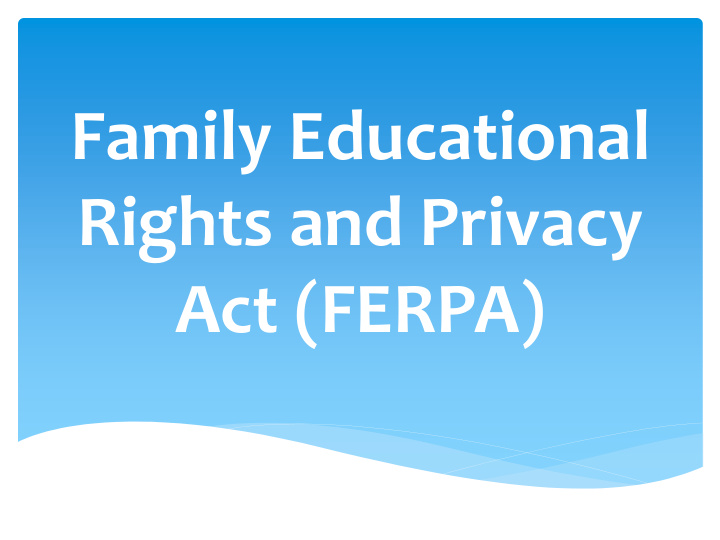



Family Educational Rights and Privacy Act (FERPA)
Family Educational Rights and Privacy Act (FERPA) Federal Legislation passed in 1974, amended in 1996 Two Components • Rights of parents/students to inspect/review student records • Responsibility of schools and school staff to maintain confidentiality of student information Purpose of this Presentation: Review confidentiality requirements under FERPA
Why is FERPA and Maintaining Confidentiality Important? Consequences of not following FERPA requirements and not maintaining confidentiality: • Loss of parent confidence! • Parent complaints to the U.S. Department of Education • Loss of federal funds • Staff discipline/dismissal
FERPA refers to student information as “Education Records” Definition of Education Record • Records, files, documents and other materials which contain information directly related to a student and are maintained by an educational agency or institution, or by a person acting for such agency or institution.
Education record includes any record containing “Personally Identifiable Information” (PII) • Date and place of birth • Parents’/guardians’ addresses and emergency contacts • Grades, test scores, courses taken • Official correspondence regarding student status or discipline • Disciplinary records • Special Education records • Medical/health records • Records re. attendance and schools attended – This pertains to both hard copy and electronic storage! See school board policy for how your district defines PII.
FERPA dictates that, without written parent/guardian consent, education records/personally identifiable information may only be shared with: • Other school employees who have a need to know and “legitimate educational interest.” Simply being another employee from your school district does not satisfy this requirement. • Other schools to which a student is transferring. • Certain government officials in order to carry out lawful functions. • Persons having need to know in cases of health and safety emergencies. • State and local authorities within the juvenile justice system. • Individuals who have obtained court orders or subpoenas. Note: Though not required by FERPA, any court order or subpoena immediately should be given to the superintendent or the superintendent's designee for review. Note of caution re. electronic communication (e.g. email, text, and social media): Be Careful!
Exception to requirement for written parent consent relates to what FERPA refers to as “Directory Information.” • School board policy designates items such as the following as Directory Information • Student Name • Major field of study • Participation in officially recognized activities and sports • Height if member of an athletic team • Weight, if member of athletic team which requires disclosure to participate • Dates of attendance • Dates of graduation • Awards received • Honor rolls • Scholarships • School photographs or videos of students participating in school activities, events, or programs • See your school board policy for specifics.
Confidentiality Words of Caution DO NOT: • Share information about students or parents with anyone other than a colleague with “need to know.” Never share gossip. • “Chit - chat” about students or parents over the backyard fence, at Wal-Mart or Kroger, or at a ballgame, etc. • Discuss students or parents on Facebook, Twitter, or in indiscriminate email, etc. • Routinely send emails about students or parents • If you send an email about a student or parent to anyone, make sure that what is included has a legitimate purpose in advancing the district’s mission and that it only is sent to persons with a need to know. Mark such email as “confidential.”
Gossip vs. Professional Sharing of Information When Talking to a colleague about a Four Tests student or his family, apply these 1. What is discussed four tests to see if 2. Where the discussion takes place the discussion may 3. Who is listening be violating the student’s 4. Why the discussion took place confidentiality rights.
What is Discussed • If the discussion involves directory information (name, address, etc.) there is no problem unless the parent has refused to have this information released. • If the discussion involves other personally identifiable information that is confidential (disability, family data, etc.), the parties should be sure that legitimate educational interest is involved. • If the discussion involves information that is rumor, opinion, or hearsay, chances are that confidentiality will be in question, and the parties have moved from professionalism to gossip.
Where the Discussion Takes Place • If the discussion occurs in a private place (such as a teacher’s empty room or empty teacher’s lounge), there is no problem with confidentiality. • If the discussion occurs in a public place (such as the playground, the halls, a busy teacher’s lounge, the supermarket, etc.), there is a good chance that confidentiality could be violated.
Who is Listening • If the parties to the discussion are school officials with legitimate educational interest, there is no problem with confidentiality. • If others are listening who have no legitimate educational interest (such as a teacher who is eavesdropping, a nosy child on the playground, children in the hall, etc.), confidentiality may be violated.
Why the Discussion Took Place • If the parties have legitimate educational interest in a student and are sharing information that will help them work with the child, then there is no problem with confidentiality. • If the parties are gossiping to pass time, carrying tales about a student or his family, or for other non- educational reasons, there is probably a problem with confidentiality.
States can go beyond what is required by FERPA. New state law, PA 367 (MCL 380.1136), went into effect March 22, 2017 affecting pupil privacy. Districts’ FERPA Policy should be revised to reflect this new law which does the following: Restricts MDE/CEPI from disclosing student information Prohibits schools from selling or providing PII to “for -profit business entities”. Requires schools to disclose to parents, within 30 days of written request: student information provided to any “person, agency, or organization”; name/contact information of each such entity to whom discloser was made, and “legitimate reason” for discloser.
U.S. Department of Education Email Updates https://public.govdelivery.com/accoun ts/USED/subscriber/new
QUESTIONS? Craig Gerard, HR Specialist Lapeer County ISD Email:cgerard@lapeerisd.org
Recommend
More recommend